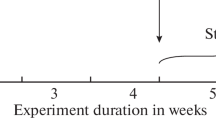Abstract
Intensified catabolism with activated proteolysis caused by stress and high temperature as a physical and chemical factor was found to be the typical response of the human body at the first stage of acute overheating. The data on the glutathione, which detoxifies lipid peroxides and protects proteins from oxidation, showed that hyperthermia strained the body antioxidant mechanisms. The body resistance to overheating depended on its initial status characterized by specific metabolic conditions.
Similar content being viewed by others
References
L. I. Andreeva, L. A. Kozhemyakin, and A. A. Kishkun,Lab. Delo, No. 11, 41–43 (1988).
B. A. Badyshtov, S. I. Sytnik, V. A. Pastushenkovet al., Fiziol. Chel.,19, No. 5, 127–134 (1993).
V. V. Gavrilov and I. F. Khmara,Klin. Lab. Diagn., No. 12 721–724 (1995).
V. V. Goranchuk and E. B. Shustov,Fiziol. Chel.,23, No. 4, 98–105 (1997).
E. E. Dubinina, L. A. Sal'nikova and L. F. Efimova,Lab. Delo, No. 10, 30–31 (1983).
N. B. Kozlov, In:Pathological Biochemistry and Physiology of Overheating [in Russian], Smolensk (1978) pp. 3–14.
N. B. Kozlov,Hyperthermia: Biochemical Foundations of Pathogenesis, Prevention and Treatment [in Russian], Voronezh (1990).
L. S. Kolesnichenko and V. I. Kulinski,Uspekhi Sovrem. Biol.,107, No. 2, 179–194 (1989).
V. S. Koscheev and V. I. Kuznets,Physiology and Hygiene of Individual Protection Under Conditions of High Temperatures [in Russian], Moscow (1986).
M. Ya. Malakhova,A Method of Registration of Endogenous Intoxication. Manual for Physicians [in Russian], St.-Petersburg (1995).
M. Ya. Malakhova, A. V. Solomennikov, N. A. Belyakov,et al., Lab. Delo, No. 3, 224–227 (1987).
V. S. Novikov, V. V. Goranchuk, and E. B. Shustov,Klin. Med. i Pathofiziol., No. 3 70–77 (1997).
I. T. Rozovskaya,Lab. Delo, No. 8, 464–467 (1967).
V. I. Rubin, E. G. Larski, and L. S. Orlova,Biochemical Methods of Examination in Clinics [in Russian], Saratov (1980).
A. Yu. Tilis, In:Pathological Physiology of Extreme Conditions. Metabolic and Physiological Characteristics of Immediate Human Body Response to Overheating [in Russian] Moscow (1973) pp. 202–224.
G. L. Ellman,Arch. Biochem. Biophys.,82, No. 1, 70–77 (1959).
W. H. Habig, M. S. Pabst and W. B. Jackoby,J. Biol. Chem.,249, No. 22, 7130–7139 (1974).
Author information
Authors and Affiliations
Additional information
Translated fromByulleten' Eksperimental'noi Biologii i Meditsiny, Vol. 127, No. 1, pp. 19–23, January 1999
Rights and permissions
About this article
Cite this article
Andreeva, L.I., Goranchuk, V.V., Stolyarova, N.A. et al. Metabolic and physiological characteristics of immediate response to overheating in man. Bull Exp Biol Med 127, 14–18 (1999). https://doi.org/10.1007/BF02432790
Received:
Issue Date:
DOI: https://doi.org/10.1007/BF02432790




